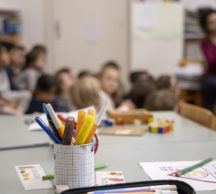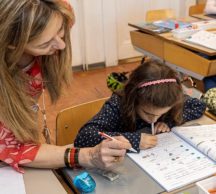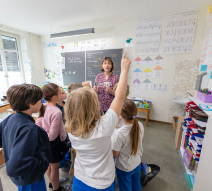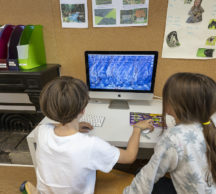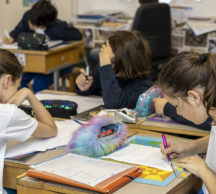Preschool
Our preschool class welcomes children aged three. We make sure they enjoy their initial contact with community life. What is important is that each child is keen to go to school. This will make it all the more easy for them to embrace the next steps of learning.
The program in detail
- Reading
- Mathematical games
- Workshops for independent living
- English
- Singing and poetry
- Drawing – Painting – Craft
- Cooking
- Rhythm
- Free games
- Optional afternoons
- Children have at their disposal:
Reading
Children enjoy a small library where they can discover a new world by themselves (they can handle and touch things, and develop their imagination).
The teacher reads them stories for pleasure and uses these as the bases for pursuing different activities.
Mathematical games
Through suitable mathematics-based games, children learn and apply simple rules for directions, coding, equivalence relations and matching. Pupils are introduced to the notion of numbers.
Workshops for independent living
Practical living workshops
These workshops focus on actions of everyday life, through which day-to-day activities can be repeated and therefore perfected. The sessions motivate children as they involve actions they have observed in daily life, actions they would like to perform themselves to become more independent. These workshops also help develop fine motor skills: pouring, decanting, screwing, pinching, fastening, threading, hanging and so on. These workshops mainly take place in the first quarter.
Mathematics workshops
Shapes and sizes, sorting, logical categorising, structuring in space and time, numbering, distributing, pairing, counting, comparing quantities, resolving problems concerning quantities. The mathematics workshops take place all year round from November.
Sensory living workshops
These are workshops for honing skills. They help children observe, handle, reflect, understand, deduce and therefore think. The workshops take place all year round.
English
This is an introduction to the English language through songs, games, storytelling and tales told through puppetry in weekly sessions.
These lessons are given by a specialist teacher who is a native English-speaker.
Singing and poetry
Songs and poems are taught, sung and read each day. They are a joy for children and give them a chance to memorise texts, melodies and rhythms. Through movements and intonation, children can fully express themselves.
Drawing – Painting – Craft
Beyond the use of pencils and brushes, children are introduced to other techniques: finger painting, sponge or toothbrush printing, and so on.
The discovery of different materials is very important for children aged three. They can therefore use wool, cotton, modelling clay, feathers, cardboard, fabrics and so on to produce craftwork that decorates the classroom and, above all, helps them master manual work.
Cooking
With help from their teachers, the children learn to follow a few simple, tasty recipes.
Rhythm
Pupils feel what they hear through the bodily interpretation of sounds and rhythms played by the teacher. Stimulating their motor skills helps them use their body as their first instrument.
Free games
Using the required materials, children are free to respond to their need to play as they wish, alone or in a group. They enjoy making their first friends in a pleasant class.
Optional afternoons
If their parents wish so, pupils in the preschool class can carry on with their school day in our afternoon class.
They can therefore supplement what they learn in the morning.
Children have at their disposal:
- The free games corner, where symbol-based play helps them develop their imagination, sensibilities and openness to the world
- The reading corner, where the teacher reads stories and children look at the books and listen to music
- The mathematical games corner, where their boost their knowledge
- The workshop corner, where they can develop their imagination and talents as budding artists through painting, modelling clay, collage and craftwork (carried out using a wide range of materials like wood, paper, plastic, fabric, wool, sponge, etc.)
Toutes les informations pour procéder aux démarches d’admission sont disponibles en ligne :
Admissions
